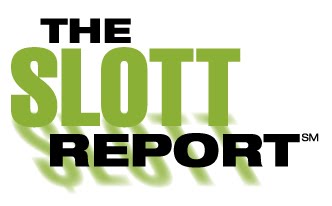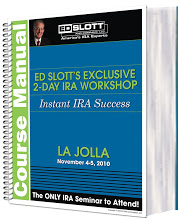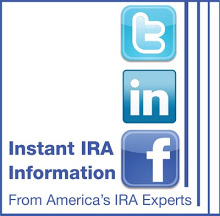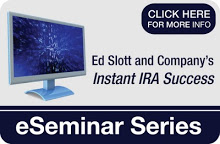This is the moment! This is the day!
Today is a very significant day for retirement account owners. Today, Friday October 15, 2010, is the last day to recharacterize a 2009 Roth IRA conversion. What makes this day so special though is that it’s also the last deadline - ever - for someone who has to recharacterize. That’s because in 2009, if you had modified adjusted gross income (MAGI) over $100,000 or were married but filed a separate return from your spouse, you were not eligible to make a Roth conversion. Those restrictions were permanently removed beginning January 1st this year (2010) though, so going forward, no one will be ineligible to convert to a Roth IRA and have to recharacterize back to an IRA again.
Today is also the last day that a traditional IRA contribution or Roth IRA contribution can be recharacterized. What does that mean? Simply that if you made a contribution to one type of IRA last year, but have since changed your mind and want it to be in the opposite type of account, you choose to have it be treated as if it were originally made to the preferred type of account. Keep in mind that although there are no limits on traditional IRA contributions (only limits for whether or not they may be deducted), there were (and still are) Roth IRA contribution limits.
The “fun” doesn’t stop with recharacterizations though! Today is also the last day to remove a 2009 excess contribution from an IRA or Roth IRA. See, now doesn’t that sound exciting? Remember the contribution limit last year for IRAs was $5,000 - or $6,000 if you were 50 or older by the end of the year. So if you put more than that into all your IRAs (Roth and traditional) last year - and it didn’t come from a rollover - you’ve probably got an excess contribution which needs to be removed by today, along with its attributable earnings (or losses), in order to avoid a 6% excess contribution penalty. The 6% penalty would be assessed each year until you make the correction.
So be sure to make those last second IRA moves if you need to and have a happy, happy October 15th!
By IRA Technical Consultant Jeffrey Levine and Jared Trexler
------------------------------------------------------------------------------
Comment, Question, Discussion Topic on your mind? Click on the Blue Comment Link below and leave your thoughts then check back to see what other consumers and advisors think.
*Copyright 2010 Ed Slott and Company, LLC
Friday, October 15, 2010
Last Day to Recharacterize 2009 Roth Conversion
Posted by
Ed Slott and Company, LLC
at
12:41 PM
0
comments

 Labels:
IRAs,
Jeff Levine,
Retirement,
Roth IRAs,
Roth Recharacterizations
Labels:
IRAs,
Jeff Levine,
Retirement,
Roth IRAs,
Roth Recharacterizations
Thursday, October 14, 2010
RMDs While Working? Find Out in Mailbag
This week's Slott Report Mailbag discusses some complex, timely issues involving social security benefits and required minimum distributions while working past age 70 1/2. As always, we stress the importance of working with a competent, educated financial advisor to keep your retirement nest egg safe and secure.
1.
Ed and Company,
My spouse is 67 and I am 66. We are not receiving social security benefits at this time (we plan on waiting until age 70). I recently read that if one of us signs up for social security now, and then requests a suspension, that the other can sign up for a spousal benefit. There are no reductions when we take the full benefits at age 70.
We are looking for advice/guidance in this matter. Do you have any suggestions?
Thanks,
Jackie Byrd
Answer:
Yes you have several options of when and how to take Social Security for you and your spouse. I would suggest contacting your local social security office. They are very good at explaining all your options. You can also find a lot of information on your different options on the Social Security website, www.socialsecurity.gov.
2.
I’m now 70 ½ but still working full time. I have my retirement savings in a 401(k) plan sponsored by my employer, with monthly contributions. I’m planning to work until I’m about 75 years old and would like to keep my savings untouched until then. I read that while I’m still working I cannot be forced by the IRS regulations to take annual distributions from my 401(k) account, even if I’m over 70 ½ years old. Is that correct?
Thank you for your advice.
Answer:
You are correct. The IRS regulations now allow you to not take required minimum distributions (RMDs) from employer plans at age 70 1/2 if you are still working for the company that sponsors the plan and you do not own more than 5% of the company (this does not include SEP and SIMPLE plans). You can also continue having money from your salary deposited into your 401(k) plan while you are still working after age 70 ½ and you may also be entitled to an employer match for your deferrals. However, all of these options are not mandatory but must be allowed by the employer plan. When you retire, your required beginning date is April 1 of the year following your retirement. This means that you will have to take an RMD for the year of your retirement which can be deferred to the April 1st date. Your second RMD must be taken for the year after your retirement. If you defer that first distribution, then you will have to take two distributions in the year after your retirement.
3.
Ed and Company,
Greatly enjoy your PBS specials.
I am 60 years of age. If I take a lump sum from my TSA, I know they hold 20% for the IRS. However, are there any other pitfalls, as this will boost our 2010 adjusted gross income from 78k to about 140k. I am always concerned about surprises like the alternative minimum tax law. Your help is most appreciated.
Thanks,
D. Thompson
Answer:
One way to defer income tax on a lump-sum distribution is to do a direct rollover (trustee to trustee transfer) to an IRA. There would not be any 20% withholding on this type of distribution. If you take a lump sum distribution but do not do a rollover to an IRA within 60 days, then the total amount of the lump-sum distribution minus any after tax dollars, if any, will be added to your income in the year you receive the distribution. As your income increases, your tax bracket may increase and you may start to have some of your deductions begin to phase out. Before taking a lump-sum distribution you should consult a competent financial advisor with special knowledge in this area. You might want to consult our web site www.irahelp.com and click on find an advisor to locate an advisor in your area that has been trained by Ed Slott & Co.
By IRA Technical Consultant Marvin Rotenberg and Jared Trexler
------------------------------------------------------------------------------
Comment, Question, Discussion Topic on your mind? Click on the Blue Comment Link below and leave your thoughts then check back to see what other consumers and advisors think.
*Copyright 2010 Ed Slott and Company, LLC
1.
Ed and Company,
My spouse is 67 and I am 66. We are not receiving social security benefits at this time (we plan on waiting until age 70). I recently read that if one of us signs up for social security now, and then requests a suspension, that the other can sign up for a spousal benefit. There are no reductions when we take the full benefits at age 70.
We are looking for advice/guidance in this matter. Do you have any suggestions?
Thanks,
Jackie Byrd
Answer:
Yes you have several options of when and how to take Social Security for you and your spouse. I would suggest contacting your local social security office. They are very good at explaining all your options. You can also find a lot of information on your different options on the Social Security website, www.socialsecurity.gov.
2.
I’m now 70 ½ but still working full time. I have my retirement savings in a 401(k) plan sponsored by my employer, with monthly contributions. I’m planning to work until I’m about 75 years old and would like to keep my savings untouched until then. I read that while I’m still working I cannot be forced by the IRS regulations to take annual distributions from my 401(k) account, even if I’m over 70 ½ years old. Is that correct?
Thank you for your advice.
Answer:
You are correct. The IRS regulations now allow you to not take required minimum distributions (RMDs) from employer plans at age 70 1/2 if you are still working for the company that sponsors the plan and you do not own more than 5% of the company (this does not include SEP and SIMPLE plans). You can also continue having money from your salary deposited into your 401(k) plan while you are still working after age 70 ½ and you may also be entitled to an employer match for your deferrals. However, all of these options are not mandatory but must be allowed by the employer plan. When you retire, your required beginning date is April 1 of the year following your retirement. This means that you will have to take an RMD for the year of your retirement which can be deferred to the April 1st date. Your second RMD must be taken for the year after your retirement. If you defer that first distribution, then you will have to take two distributions in the year after your retirement.
3.
Ed and Company,
Greatly enjoy your PBS specials.
I am 60 years of age. If I take a lump sum from my TSA, I know they hold 20% for the IRS. However, are there any other pitfalls, as this will boost our 2010 adjusted gross income from 78k to about 140k. I am always concerned about surprises like the alternative minimum tax law. Your help is most appreciated.
Thanks,
D. Thompson
Answer:
One way to defer income tax on a lump-sum distribution is to do a direct rollover (trustee to trustee transfer) to an IRA. There would not be any 20% withholding on this type of distribution. If you take a lump sum distribution but do not do a rollover to an IRA within 60 days, then the total amount of the lump-sum distribution minus any after tax dollars, if any, will be added to your income in the year you receive the distribution. As your income increases, your tax bracket may increase and you may start to have some of your deductions begin to phase out. Before taking a lump-sum distribution you should consult a competent financial advisor with special knowledge in this area. You might want to consult our web site www.irahelp.com and click on find an advisor to locate an advisor in your area that has been trained by Ed Slott & Co.
By IRA Technical Consultant Marvin Rotenberg and Jared Trexler
------------------------------------------------------------------------------
Comment, Question, Discussion Topic on your mind? Click on the Blue Comment Link below and leave your thoughts then check back to see what other consumers and advisors think.
*Copyright 2010 Ed Slott and Company, LLC
Posted by
Ed Slott and Company, LLC
at
3:10 PM
0
comments

 Labels:
IRAs,
Mailbag,
marvin rotenberg,
Tax Planning
Labels:
IRAs,
Mailbag,
marvin rotenberg,
Tax Planning
Ed Slott and Company In The News
Ed Slott and Company have been in the news preaching the benefits of a discussion about Roth conversions before year-end. All consumers should sit down with their financial advisors to discuss the benefits of a conversion.
Ed Slott was quoted in a recent article that appeared in the Philadelphia, Inquirer, St. Louis Post-Dispatch and on the websites on MSN Money and CNBC. The article, titled, "Rush to Roths for tax rates, 2010-only benefit" discussed the issue of a larger rhetorical question:
"Why pay taxes before you absolutely have to? Because you may pay significantly more if you wait."
Slott is quoted as saying: "Anyone with a significant balance in an IRA should at least evaluate a Roth conversion before the year ends."
CLICK HERE to read the entire article.
Also, MarketWatch's Robert Powell sought the guidance of IRA Technical Consultant Beverly DeVeny in an article titled, "Attend to IRA chores before it is too late."
The article goes point-by-point through an important year-end checklist. At the top of the list? Make sure to take required minimum distribution.
DeVeny is quoted as saying: "Look at all owned IRA accounts and employer plans for individuals age 70 1/2 or older this year, as well as inherited IRAs, employer plans and Roth IRAs."
CLICK HERE to read the entire article.
------------------------------------------------------------------------------
Comment, Question, Discussion Topic on your mind? Click on the Blue Comment Link below and leave your thoughts then check back to see what other consumers and advisors think.
*Copyright 2010 Ed Slott and Company, LLC
Ed Slott was quoted in a recent article that appeared in the Philadelphia, Inquirer, St. Louis Post-Dispatch and on the websites on MSN Money and CNBC. The article, titled, "Rush to Roths for tax rates, 2010-only benefit" discussed the issue of a larger rhetorical question:
"Why pay taxes before you absolutely have to? Because you may pay significantly more if you wait."
Slott is quoted as saying: "Anyone with a significant balance in an IRA should at least evaluate a Roth conversion before the year ends."
CLICK HERE to read the entire article.
Also, MarketWatch's Robert Powell sought the guidance of IRA Technical Consultant Beverly DeVeny in an article titled, "Attend to IRA chores before it is too late."
The article goes point-by-point through an important year-end checklist. At the top of the list? Make sure to take required minimum distribution.
DeVeny is quoted as saying: "Look at all owned IRA accounts and employer plans for individuals age 70 1/2 or older this year, as well as inherited IRAs, employer plans and Roth IRAs."
CLICK HERE to read the entire article.
------------------------------------------------------------------------------
Comment, Question, Discussion Topic on your mind? Click on the Blue Comment Link below and leave your thoughts then check back to see what other consumers and advisors think.
*Copyright 2010 Ed Slott and Company, LLC
Wednesday, October 13, 2010
IRA Subject to IRS Levy?
Can an IRA be levied by IRS?
The bad news is that, yes, it can be subject to an IRS levy.
The good news is that such a levy will not be subject to the 10% early distribution penalty if you are under age 59 ½ at the time of the levy. The amount taken by IRS will be reported as a distribution to you and you will owe income tax on the amount taken by IRS.
WHAT NOT TO DO:
If you are under age 59 ½, wait for IRS to do the levy on your IRA account. If you take the funds out of the IRA and use them to pay the IRS, you will owe the 10% penalty. You can save yourself the penalty by waiting for IRS to take the funds.
Don’t empty the account and put the money under your mattress while you wait for things to work out with IRS and think that you can later put the funds back into your IRA. You only have 60 days to put the funds back - and that is only if you have not done another 60-day rollover to or from that IRA in the past 12 months. If you miss the 60 day deadline you will end up with a taxable distribution of your entire account balance, plus the 10% penalty if you are under age 59 ½. IRS will not give you an extension of time to put the funds back as one individual found out in Private Letter Ruling 200428031. IRS denied his request saying “Actions by a taxpayer to deliberately avoid a Service levy do not represent the type of circumstances upon which a waiver of the 60 day rollover requirement should be based under Rev. Proc. 2003-16.”
By IRA Technical Consultant Beverly DeVeny and Jared Trexler
------------------------------------------------------------------------------
Comment, Question, Discussion Topic on your mind? Click on the Blue Comment Link below and leave your thoughts then check back to see what other consumers and advisors think.
*Copyright 2010 Ed Slott and Company, LLC
The bad news is that, yes, it can be subject to an IRS levy.
The good news is that such a levy will not be subject to the 10% early distribution penalty if you are under age 59 ½ at the time of the levy. The amount taken by IRS will be reported as a distribution to you and you will owe income tax on the amount taken by IRS.
WHAT NOT TO DO:
If you are under age 59 ½, wait for IRS to do the levy on your IRA account. If you take the funds out of the IRA and use them to pay the IRS, you will owe the 10% penalty. You can save yourself the penalty by waiting for IRS to take the funds.
Don’t empty the account and put the money under your mattress while you wait for things to work out with IRS and think that you can later put the funds back into your IRA. You only have 60 days to put the funds back - and that is only if you have not done another 60-day rollover to or from that IRA in the past 12 months. If you miss the 60 day deadline you will end up with a taxable distribution of your entire account balance, plus the 10% penalty if you are under age 59 ½. IRS will not give you an extension of time to put the funds back as one individual found out in Private Letter Ruling 200428031. IRS denied his request saying “Actions by a taxpayer to deliberately avoid a Service levy do not represent the type of circumstances upon which a waiver of the 60 day rollover requirement should be based under Rev. Proc. 2003-16.”
By IRA Technical Consultant Beverly DeVeny and Jared Trexler
------------------------------------------------------------------------------
Comment, Question, Discussion Topic on your mind? Click on the Blue Comment Link below and leave your thoughts then check back to see what other consumers and advisors think.
*Copyright 2010 Ed Slott and Company, LLC
Posted by
Ed Slott and Company, LLC
at
10:31 AM
0
comments

 Labels:
beverly deveny,
IRAs,
IRS,
Retirement,
Tax Planning
Labels:
beverly deveny,
IRAs,
IRS,
Retirement,
Tax Planning
Tuesday, October 12, 2010
Retirement Fears: Financial Abuse of Elderly
Make sure your loved ones already in retirement are protected from financial abuse. In this installment of Retirement Fears, we outline what to watch out for from financial predators and how to protect those you love.
CLICK HERE to read this installment of Retirement Fears, and make sure a situation like this is not keeping you up at night.
By IRA Technical Consultant Marvin Rotenberg and Jared Trexler
------------------------------------------------------------------------------
Comment, Question, Discussion Topic on your mind? Click on the Blue Comment Link below and leave your thoughts then check back to see what other consumers and advisors think.
*Copyright 2010 Ed Slott and Company, LLC
CLICK HERE to read this installment of Retirement Fears, and make sure a situation like this is not keeping you up at night.
By IRA Technical Consultant Marvin Rotenberg and Jared Trexler
------------------------------------------------------------------------------
Comment, Question, Discussion Topic on your mind? Click on the Blue Comment Link below and leave your thoughts then check back to see what other consumers and advisors think.
*Copyright 2010 Ed Slott and Company, LLC
Posted by
Ed Slott and Company, LLC
at
9:13 AM
0
comments

 Labels:
IRAs,
marvin rotenberg,
Retirement Fears
Labels:
IRAs,
marvin rotenberg,
Retirement Fears
Friday, October 8, 2010
Are You An IRA Expert? Roth Recharacterizations
Welcome to the first installment of “Are You an IRA Expert?” Always thought you knew more than the next guy about IRAs and retirement accounts? Well now’s your chance to prove it. Below are three questions, ranging from beginner to expert. Test your IRA skills by trying to get all three right!
Questions:
Beginner: What is the last day a 2009 Roth conversion can be recharacterized?
Intermediate: In 2010, everyone with an eligible account (i.e. IRA, 401(k), SEP IRA) can make a conversion to a Roth IRA. In 2009 however, there were still two restrictions that prevented some people from being able to make Roth conversions. What were they?
Expert: Sally has a $50,000 IRA. On December 28, 2009, Sally took the $50,000 out of her IRA and put the money into her checking account at the bank. Later, on February 21, 2010, Sally took the $50,000 from her checking account and deposited it into a Roth IRA. Is this a valid Roth IRA conversion? And, if yes, in what year did the conversion take place?
Answers:
Beginner: Roth IRA conversions are able to be recharacterized up until October 15th of the calendar year after the conversion. Therefore, a 2009 Roth IRA conversion can be recharacterized up until October 15, 2010. That’s one week from today, so if you have a 2009 Roth conversion that you’re planning to recharacterize, you better get a move on!
Intermediate: In 2009, you were ineligible to make a Roth IRA conversion if you had modified adjusted gross income (MAGI) over $100,000. The $100,000 mark was a fixed limit, regardless of whether you filed single or a joint return. Also in 2009, you were ineligible to convert to a Roth IRA if you were married but filed a separate return from your spouse. Thankfully, as noted above, these restrictions have now been permanently lifted.
Expert: Roth conversions may be made via trustee-to-trustee transfers or via 60-day rollovers (as described in the example above). In the example, the funds left Sally’s IRA on December 28th, but were put into her Roth IRA on February 21st - within the 60-day window. Therefore, this is a valid rollover. And as for what year the conversion took place - 2009! That’s right, a Roth conversion is determined by the date the funds leave your traditional IRA, not the date they go into the Roth.
So how’d you do? Are you an IRA Expert? Unless the answer is a resounding yes, you may want to consider consulting with an advisor who has specialized knowledge and training in this area when you have these, or other IRA questions.
By IRA Technical Consultant Jeffrey Levine and Jared Trexler
------------------------------------------------------------------------------
Comment, Question, Discussion Topic on your mind? Click on the Blue Comment Link below and leave your thoughts then check back to see what other consumers and advisors think.
*Copyright 2010 Ed Slott and Company, LLC
Questions:
Beginner: What is the last day a 2009 Roth conversion can be recharacterized?
Intermediate: In 2010, everyone with an eligible account (i.e. IRA, 401(k), SEP IRA) can make a conversion to a Roth IRA. In 2009 however, there were still two restrictions that prevented some people from being able to make Roth conversions. What were they?
Expert: Sally has a $50,000 IRA. On December 28, 2009, Sally took the $50,000 out of her IRA and put the money into her checking account at the bank. Later, on February 21, 2010, Sally took the $50,000 from her checking account and deposited it into a Roth IRA. Is this a valid Roth IRA conversion? And, if yes, in what year did the conversion take place?
Answers:
Beginner: Roth IRA conversions are able to be recharacterized up until October 15th of the calendar year after the conversion. Therefore, a 2009 Roth IRA conversion can be recharacterized up until October 15, 2010. That’s one week from today, so if you have a 2009 Roth conversion that you’re planning to recharacterize, you better get a move on!
Intermediate: In 2009, you were ineligible to make a Roth IRA conversion if you had modified adjusted gross income (MAGI) over $100,000. The $100,000 mark was a fixed limit, regardless of whether you filed single or a joint return. Also in 2009, you were ineligible to convert to a Roth IRA if you were married but filed a separate return from your spouse. Thankfully, as noted above, these restrictions have now been permanently lifted.
Expert: Roth conversions may be made via trustee-to-trustee transfers or via 60-day rollovers (as described in the example above). In the example, the funds left Sally’s IRA on December 28th, but were put into her Roth IRA on February 21st - within the 60-day window. Therefore, this is a valid rollover. And as for what year the conversion took place - 2009! That’s right, a Roth conversion is determined by the date the funds leave your traditional IRA, not the date they go into the Roth.
So how’d you do? Are you an IRA Expert? Unless the answer is a resounding yes, you may want to consider consulting with an advisor who has specialized knowledge and training in this area when you have these, or other IRA questions.
By IRA Technical Consultant Jeffrey Levine and Jared Trexler
------------------------------------------------------------------------------
Comment, Question, Discussion Topic on your mind? Click on the Blue Comment Link below and leave your thoughts then check back to see what other consumers and advisors think.
*Copyright 2010 Ed Slott and Company, LLC
Posted by
Ed Slott and Company, LLC
at
2:46 PM
0
comments

 Labels:
IRAs,
Jeff Levine,
Retirement,
Roth IRAs,
Roth Recharacterizations
Labels:
IRAs,
Jeff Levine,
Retirement,
Roth IRAs,
Roth Recharacterizations
Ed Slott and Company on YouTube
We have created a visual voice to provide instant IRA information, sneak peaks at Ed Slott's top fundraising Public Television Specials, media appearances and informative, thought-provoking videos from around the web.
Ed Slott and Company is now on YouTube! CLICK HERE to visit the page and MAKE SURE to subscribe so you receive alerts when we added new videos.
If you have any questions, give us a call at 215-557-7022.
------------------------------------------------------------------------------
Comment, Question, Discussion Topic on your mind? Click on the Blue Comment Link below and leave your thoughts then check back to see what other consumers and advisors think.
*Copyright 2010 Ed Slott and Company, LLC
Ed Slott and Company is now on YouTube! CLICK HERE to visit the page and MAKE SURE to subscribe so you receive alerts when we added new videos.
If you have any questions, give us a call at 215-557-7022.
------------------------------------------------------------------------------
Comment, Question, Discussion Topic on your mind? Click on the Blue Comment Link below and leave your thoughts then check back to see what other consumers and advisors think.
*Copyright 2010 Ed Slott and Company, LLC
Trusts as Beneficiaries Highlights Mailbag
This week's Slott Report Mailbag discusses some complex, timely issues involving a bank error Roth IRA contributions and naming trusts as beneficiaries. As always, we stress the importance of working with a competent, educated financial advisor to keep your retirement nest egg safe and secure.
1.
The company I work for contributes money to a SEP IRA for its employees. I have read that an individual can't contribute to a Roth IRA if they have a workplace retirement plan. My income does not exceed the limits for a Roth contribution. Does the SEP IRA contribution keep me from being able to contribute to a Roth? Secondly, the SEP contribution is less than $5,000 so if I can't contribute the entire amount to a Roth, can I contribute the difference between the SEP contribution and the $5,000 limit on contributions to a Roth?
Thank you for your assistance.
Answer:
Your Roth IRA contribution is completely separate from your SEP IRA contribution. If you are age 50 or over on 12/31 of this year and you have earned income of $6,000 you can contribute to a Roth IRA for 2010. If you are younger than age 50, the maximum you can contribute is $5,000.
There are income limits for contributions to Roth IRAs. If you are filing a joint return the phase out limit for contributions is $167,000-$177,000. That means if your joint income is over $177,000 for 2010 you can not contribute to a Roth IRA. If you are single the phase out limit is $105,000-$120,000.
2.
Hello Ed and Company,
We have our children (grandchildren) listed as secondary beneficiaries on our father's IRA. However, his will lists his wife (now deceased) as primary beneficiary and us (the children) as secondary beneficiaries. It does not specify his grandchildren, nor does it state the creation of a trust with trustees for the grandchildren.
We were told that the IRA would end up in surrogate court in minor accounts, not in trust where the grandchidren would gain access to all of the money at age 18. In addition, the children could access the money (although very difficult) via the surrogate minor account.
Is this the case? Do we need to have the grandchildren listed in the will through the creation of a trust. What is the best way to have it passed on to them.
Answer:
Your father's will does not control where his IRA will go upon death. The IRA designation of beneficiary form on file with the IRA custodian will govern the IRA assets. If the primary beneficiary of the IRA is now deceased then by operation of law the secondary beneficiaries will become the primary beneficiaries. It would be a good idea, however, to now make any necessary changes to the beneficiary form.
State law will vary on how funds are handled for minor beneficiaries. The process you describe could very well be the way your state would handle funds inherited directly by minors. The money in the IRA going to minor children can be protected and more easily accessed by having a trust named as beneficiary for the minors and the trust will govern when and how they will get the money. Naming a trust as beneficiary could be difficult. I would recommend that you seek further professional help from an attorney or competent financial advisor.
3.
Hi Ed and Company,
I watch your PBS shows all of the time. When you say, "do not take the money out of the IRA because you have to pay taxes", BUT I have a small traditional and Roth IRA worth $43,000 for both of them combined. I am 73 years old and looking for something to help me in retirement. If I want to take the money out and put it towards a home, however, you say do not touch the traditional IRA because of taxes so what is your suggestion.
Sincerely,
Parvin Roushan
Answer:
You are correct that the amount withdrawn from a traditional IRA will be taxed. However, your contribution to your Roth IRA was not income tax deductible so you can always take that money out tax-free. If you had the Roth IRA open for 5 years or longer there will be no taxes or penalties due on your withdrawals since you are over the age of 59 1/2. While Ed does state that you should leave your IRA funds in the account for as long as possible, he also says that you should not deprive yourself of necessities in order to maintain your IRA balance. If you need the funds to buy a house and you will have enough other funds to live on after purchasing your house, then use the IRA funds.
By IRA Technical Consultant Marvin Rotenberg and Jared Trexler
------------------------------------------------------------------------------
Comment, Question, Discussion Topic on your mind? Click on the Blue Comment Link below and leave your thoughts then check back to see what other consumers and advisors think.
*Copyright 2010 Ed Slott and Company, LLC
1.
The company I work for contributes money to a SEP IRA for its employees. I have read that an individual can't contribute to a Roth IRA if they have a workplace retirement plan. My income does not exceed the limits for a Roth contribution. Does the SEP IRA contribution keep me from being able to contribute to a Roth? Secondly, the SEP contribution is less than $5,000 so if I can't contribute the entire amount to a Roth, can I contribute the difference between the SEP contribution and the $5,000 limit on contributions to a Roth?
Thank you for your assistance.
Answer:
Your Roth IRA contribution is completely separate from your SEP IRA contribution. If you are age 50 or over on 12/31 of this year and you have earned income of $6,000 you can contribute to a Roth IRA for 2010. If you are younger than age 50, the maximum you can contribute is $5,000.
There are income limits for contributions to Roth IRAs. If you are filing a joint return the phase out limit for contributions is $167,000-$177,000. That means if your joint income is over $177,000 for 2010 you can not contribute to a Roth IRA. If you are single the phase out limit is $105,000-$120,000.
2.
Hello Ed and Company,
We have our children (grandchildren) listed as secondary beneficiaries on our father's IRA. However, his will lists his wife (now deceased) as primary beneficiary and us (the children) as secondary beneficiaries. It does not specify his grandchildren, nor does it state the creation of a trust with trustees for the grandchildren.
We were told that the IRA would end up in surrogate court in minor accounts, not in trust where the grandchidren would gain access to all of the money at age 18. In addition, the children could access the money (although very difficult) via the surrogate minor account.
Is this the case? Do we need to have the grandchildren listed in the will through the creation of a trust. What is the best way to have it passed on to them.
Answer:
Your father's will does not control where his IRA will go upon death. The IRA designation of beneficiary form on file with the IRA custodian will govern the IRA assets. If the primary beneficiary of the IRA is now deceased then by operation of law the secondary beneficiaries will become the primary beneficiaries. It would be a good idea, however, to now make any necessary changes to the beneficiary form.
State law will vary on how funds are handled for minor beneficiaries. The process you describe could very well be the way your state would handle funds inherited directly by minors. The money in the IRA going to minor children can be protected and more easily accessed by having a trust named as beneficiary for the minors and the trust will govern when and how they will get the money. Naming a trust as beneficiary could be difficult. I would recommend that you seek further professional help from an attorney or competent financial advisor.
3.
Hi Ed and Company,
I watch your PBS shows all of the time. When you say, "do not take the money out of the IRA because you have to pay taxes", BUT I have a small traditional and Roth IRA worth $43,000 for both of them combined. I am 73 years old and looking for something to help me in retirement. If I want to take the money out and put it towards a home, however, you say do not touch the traditional IRA because of taxes so what is your suggestion.
Sincerely,
Parvin Roushan
Answer:
You are correct that the amount withdrawn from a traditional IRA will be taxed. However, your contribution to your Roth IRA was not income tax deductible so you can always take that money out tax-free. If you had the Roth IRA open for 5 years or longer there will be no taxes or penalties due on your withdrawals since you are over the age of 59 1/2. While Ed does state that you should leave your IRA funds in the account for as long as possible, he also says that you should not deprive yourself of necessities in order to maintain your IRA balance. If you need the funds to buy a house and you will have enough other funds to live on after purchasing your house, then use the IRA funds.
By IRA Technical Consultant Marvin Rotenberg and Jared Trexler
------------------------------------------------------------------------------
Comment, Question, Discussion Topic on your mind? Click on the Blue Comment Link below and leave your thoughts then check back to see what other consumers and advisors think.
*Copyright 2010 Ed Slott and Company, LLC
Posted by
Ed Slott and Company, LLC
at
10:03 AM
0
comments

 Labels:
IRAs,
Mailbag,
marvin rotenberg,
Retirement,
Roth IRAs
Labels:
IRAs,
Mailbag,
marvin rotenberg,
Retirement,
Roth IRAs
Wednesday, October 6, 2010
10 Reasons to Open Roth IRA
U.S. News & World Report ran an October 6th piece titled, "10Reasons to Open a Roth IRA". In that article, author Emily Brandon highlighted the reasons to open a Roth IRA, especially with the new rules that went into effect this year.
Ed Slott talked about the benefits for young people (yes, young people should think about opening a Roth IRA!). "Young people should go for a Roth IRA and allow it to grow for 30 or 40 years."
CLICK HERE to read the entire article.
------------------------------------------------------------------------------
Comment, Question, Discussion Topic on your mind? Click on the Blue Comment Link below and leave your thoughts then check back to see what other consumers and advisors think.
*Copyright 2010 Ed Slott and Company, LLC
Ed Slott talked about the benefits for young people (yes, young people should think about opening a Roth IRA!). "Young people should go for a Roth IRA and allow it to grow for 30 or 40 years."
CLICK HERE to read the entire article.
------------------------------------------------------------------------------
Comment, Question, Discussion Topic on your mind? Click on the Blue Comment Link below and leave your thoughts then check back to see what other consumers and advisors think.
*Copyright 2010 Ed Slott and Company, LLC
Tuesday, October 5, 2010
Roth Recharacterizations: What Happens To Earnings or Losses
It’s time to do those last recharacterizations for 2009 and file those last returns. October 15, 2010 is the deadline for both.
When you do a Roth recharacterization, your recharacterization request is for the amount of the original conversion that you want to undo. Then you do a net income calculation and come up with the actual amount that will be transferred back to the traditional IRA. (More details on this can be found in IRS Publication 590.) The amount transferred back can be more than the original converted amount if there were gains in the Roth account or it can be less if there were losses in the Roth account.
Many taxpayers and their advisors then ask what happens to that gain or loss. The simple answer is “Nothing.” A Roth recharacterization is an undo. For tax purposes, the converted funds are treated as though they never left the IRA. So any gains or losses are treated as though they were earned inside the IRA. There is no loss you can deduct on your tax return and there is no gain to be taxed on the return.
But don’t forget to let IRS know that you have recharacterized your Roth conversion. A note must be attached to the tax return or to the amended return that gives IRS the date and amount of the conversion and the date and amount of the recharacterization. This should prevent any future communications from IRS asking for any taxes, interest, and/or penalties on the transactions.
By IRA Technical Consultant Beverly DeVeny and Jared Trexler
------------------------------------------------------------------------------
Comment, Question, Discussion Topic on your mind? Click on the Blue Comment Link below and leave your thoughts then check back to see what other consumers and advisors think.
*Copyright 2010 Ed Slott and Company, LLC
When you do a Roth recharacterization, your recharacterization request is for the amount of the original conversion that you want to undo. Then you do a net income calculation and come up with the actual amount that will be transferred back to the traditional IRA. (More details on this can be found in IRS Publication 590.) The amount transferred back can be more than the original converted amount if there were gains in the Roth account or it can be less if there were losses in the Roth account.
Many taxpayers and their advisors then ask what happens to that gain or loss. The simple answer is “Nothing.” A Roth recharacterization is an undo. For tax purposes, the converted funds are treated as though they never left the IRA. So any gains or losses are treated as though they were earned inside the IRA. There is no loss you can deduct on your tax return and there is no gain to be taxed on the return.
But don’t forget to let IRS know that you have recharacterized your Roth conversion. A note must be attached to the tax return or to the amended return that gives IRS the date and amount of the conversion and the date and amount of the recharacterization. This should prevent any future communications from IRS asking for any taxes, interest, and/or penalties on the transactions.
By IRA Technical Consultant Beverly DeVeny and Jared Trexler
------------------------------------------------------------------------------
Comment, Question, Discussion Topic on your mind? Click on the Blue Comment Link below and leave your thoughts then check back to see what other consumers and advisors think.
*Copyright 2010 Ed Slott and Company, LLC
Posted by
Ed Slott and Company, LLC
at
12:54 PM
0
comments

 Labels:
beverly deveny,
IRAs,
Retirement,
Roth IRAs,
Roth Recharacterizations
Labels:
beverly deveny,
IRAs,
Retirement,
Roth IRAs,
Roth Recharacterizations
Monday, October 4, 2010
Federal Estate Tax Update
Federal estate tax rates were significantly reduced under President George W. Bush’s Economic Growth and Tax Relief Reconciliation Act of 2001. The act also called for the federal estate tax to lapse in 2010 and to revert in 2011 to rates that were in effect immediately prior to its effective date (i.e. 2001 rates). The federal estate tax did in fact expire, and for this year (2010) there has been no federal estate tax.
If Congress takes no action before year end on this issue, the top estate tax rate on inherited assets will jump to 55% in 2011 on estates exceeding $1 million. Compare that to 2009, when the top rate was 45% with a $3.5 million exclusion.
Two bills recently proposed in the Senate would make significant changes to the federal estate tax system. One would cap the top rate at 35% with a $5 million exclusion, while the other would set a progressive rate of up to 55% with an exclusion of $3.5MM. This could of course change several times before a final bill comes out. Most political pundits seem to agree that no action will be taken before the mid-term congressional elections are concluded in November. Perhaps by the end of the year a bill will pass. As Henry Wadsworth Longfellow once said, “All good things come to those who wait.”
We will keep you up to date.
By IRA Technical Consultant Marvin Rotenberg and Jared Trexler
------------------------------------------------------------------------------
Comment, Question, Discussion Topic on your mind? Click on the Blue Comment Link below and leave your thoughts then check back to see what other consumers and advisors think.
*Copyright 2010 Ed Slott and Company, LLC
If Congress takes no action before year end on this issue, the top estate tax rate on inherited assets will jump to 55% in 2011 on estates exceeding $1 million. Compare that to 2009, when the top rate was 45% with a $3.5 million exclusion.
Two bills recently proposed in the Senate would make significant changes to the federal estate tax system. One would cap the top rate at 35% with a $5 million exclusion, while the other would set a progressive rate of up to 55% with an exclusion of $3.5MM. This could of course change several times before a final bill comes out. Most political pundits seem to agree that no action will be taken before the mid-term congressional elections are concluded in November. Perhaps by the end of the year a bill will pass. As Henry Wadsworth Longfellow once said, “All good things come to those who wait.”
We will keep you up to date.
By IRA Technical Consultant Marvin Rotenberg and Jared Trexler
------------------------------------------------------------------------------
Comment, Question, Discussion Topic on your mind? Click on the Blue Comment Link below and leave your thoughts then check back to see what other consumers and advisors think.
*Copyright 2010 Ed Slott and Company, LLC
Posted by
Ed Slott and Company, LLC
at
4:01 PM
0
comments

 Labels:
marvin rotenberg,
Retirement,
Tax Planning
Labels:
marvin rotenberg,
Retirement,
Tax Planning
Sunday, October 3, 2010
Jeffrey Levine On Air with Bill Larson
IRA Technical Consultant Jeffrey Levine will be a guest on Master Elite IRA Advisor Bill Larson's radio show "Planning for Life with Bill Larson" on KVI 570 AM at 3 PM ET this afternoon.
CLICK HERE to listen LIVE at 3 PM ET.
CLICK HERE to listen LIVE at 3 PM ET.
Friday, October 1, 2010
IRA Update: Small Business Jobs Act of 2010
The President signed the Small Business Jobs Act of 2010 into law on Monday, September 27th. We gave a brief explanation of the details and a quick analysis in Wednesday's article in this space. You can click here to view that article.
However, you can find a more detailed analysis of the Small Business Jobs Act and its effect on retirement planning at this link.
------------------------------------------------------------------------------
Comment, Question, Discussion Topic on your mind? Click on the Blue Comment Link below and leave your thoughts then check back to see what other consumers and advisors think.
*Copyright 2010 Ed Slott and Company, LLC
However, you can find a more detailed analysis of the Small Business Jobs Act and its effect on retirement planning at this link.
------------------------------------------------------------------------------
Comment, Question, Discussion Topic on your mind? Click on the Blue Comment Link below and leave your thoughts then check back to see what other consumers and advisors think.
*Copyright 2010 Ed Slott and Company, LLC
Posted by
Ed Slott and Company, LLC
at
3:25 PM
0
comments

 Labels:
financial planning,
IRAs,
Retirement,
Roth IRAs
Labels:
financial planning,
IRAs,
Retirement,
Roth IRAs
Beverly DeVeny at The Advisors MoneyShow
Financial professionals from across the country will convene at The Peabody Hotel in Orlando, Florida from November 17-19 for The Advisors MoneyShow. At this 3-day event, financial professionals will gain insight on the economy, the market...and their business.
One of our IRA Experts, Beverly DeVeny, will be speaking at this event on November 18th from 2:30-3:45 p.m. in a presentation titled, "To Roth Or Not To Roth?"
That is the question that Beverly will answer in her presentation in Orlando. Let us know if you plan on being at this event (email us at [email protected]) and stop by for information on our programs and events.
CLICK on the Advisors MoneyShow image on the left side of the page for more information and to register.
If you have any questions, please give us a call at 215-557-7022.
------------------------------------------------------------------------------
Comment, Question, Discussion Topic on your mind? Click on the Blue Comment Link below and leave your thoughts then check back to see what other consumers and advisors think.
*Copyright 2010 Ed Slott and Company, LLC
One of our IRA Experts, Beverly DeVeny, will be speaking at this event on November 18th from 2:30-3:45 p.m. in a presentation titled, "To Roth Or Not To Roth?"
That is the question that Beverly will answer in her presentation in Orlando. Let us know if you plan on being at this event (email us at [email protected]) and stop by for information on our programs and events.
CLICK on the Advisors MoneyShow image on the left side of the page for more information and to register.
If you have any questions, please give us a call at 215-557-7022.
------------------------------------------------------------------------------
Comment, Question, Discussion Topic on your mind? Click on the Blue Comment Link below and leave your thoughts then check back to see what other consumers and advisors think.
*Copyright 2010 Ed Slott and Company, LLC
Posted by
Ed Slott and Company, LLC
at
9:26 AM
0
comments

 Labels:
beverly deveny,
IRAs,
Retirement,
Roth IRAs
Labels:
beverly deveny,
IRAs,
Retirement,
Roth IRAs
Bank Errors, 60-Day Rule Highlight Mailbag
This week's Slott Report Mailbag discusses some complex, timely issues involving a bank error (whose fault is it?) and Roth recharacterizations. As always, we stress the importance of working with a competent, educated financial advisor to keep your retirement nest egg safe and secure.
1.
I converted $100K from a traditional IRA to a Roth IRA in 2008. I forgot to claim this $100K as income. The IRS has rightly advised me of this and has requested the taxes (and interest and penalty due). So far, so good.
Unfortunately in early 2009, I realized that due to an end-of-year bonus, I was ineligible to convert. So I recharacterized for $95K (the market had gone down). Must I file a 1040X for 2008 to claim less income for 2008? I assume that income is lower by $95K.
Thanks in advance.
Answer:
I assume you recharacterized your Roth IRA conversion by 10/15/09 for the 2008 conversion. The conversion should have been reported on your 2008 income tax return. When you recharacterized you were undoing the $100,000 conversion. Your return for 2008 should have shown the income from the conversion and it should have included a note telling IRS the date and amount of the conversion and the date and amount of the recharacterization. These instructions can be found in the instructions for Form 8606.
2.
I removed money from my IRA, attempted to put it back within 60 days, but my check was returned for insufficient funds. Apparently the bank the check was written from placed a hold on the funds and ended up not honoring the check when the IRA custodian tried to cash it.
The problem was later corrected and the bank claimed the funds were available the whole time and that some type of error occurred with their hold on the funds. Either way, the 60 days passed before the funds officially made it into the IRA. I only wrote one check, which was later resubmitted and finally honored (72 days after the initial distribution).
Now the funds are in the IRA but will the IRS likely require the IRA rollover to be undone and the funds taxed and penalized? Or will the IRS likely be reasonable and understand that an error occurred with the bank’s hold on her rollover funds and allow all to remain in the IRA?
Best regards,
Dan Simonds
Answer:
There is an automatic waiver for the 60 day rule if the funds are delivered to a financial institution within the 60 day period, the taxpayer followed all the procedures for a rollover and the failure to accomplish the rollover was entirely the fault of the financial institution. The rollover must be completed in one year from the date the funds were received and the rollover must have been valid if it had been completed within the 60 days. Your set of circumstances would appear to satisfy these requirements. I would suggest you document this transaction by asking the bank for a letter admitting their error and keep a detailed record of this entire transaction in your file. The money is currently in an IRA so you should not have to do anything at this point other than keeping a record of what transpired. We always recommend that a trustee to trustee transfer be done and not have a check issued to the account owner. This will avoid the meeting of the 60 day rule.
3.
I am 60 years old and I am ready to start moving some of my finances around, from forever taxed to never taxed. I am torn between purchasing a whole life insurance policy (value of $500,000) and converting my complete rollover IRA to a Roth. The cost of each is roughly the same. What would your recommendation be? My goal is to generate wealth for my children that will be transferred to them when their mother and I are deceased.
Answer:
As you know we like life insurance to protect asset value, the leverage it provides, and the fact that done correctly the death benefit will be paid on tax free basis to your estate. The Roth IRA has many advantages as well. It is difficult to pick one over the other in your case. There are many other factors to consider. I would suggest you contact a competent advisor for further analysis.
By IRA Technical Consultant Marvin Rotenberg and Jared Trexler
------------------------------------------------------------------------------
Comment, Question, Discussion Topic on your mind? Click on the Blue Comment Link below and leave your thoughts then check back to see what other consumers and advisors think.
*Copyright 2010 Ed Slott and Company, LLC
1.
I converted $100K from a traditional IRA to a Roth IRA in 2008. I forgot to claim this $100K as income. The IRS has rightly advised me of this and has requested the taxes (and interest and penalty due). So far, so good.
Unfortunately in early 2009, I realized that due to an end-of-year bonus, I was ineligible to convert. So I recharacterized for $95K (the market had gone down). Must I file a 1040X for 2008 to claim less income for 2008? I assume that income is lower by $95K.
Thanks in advance.
Answer:
I assume you recharacterized your Roth IRA conversion by 10/15/09 for the 2008 conversion. The conversion should have been reported on your 2008 income tax return. When you recharacterized you were undoing the $100,000 conversion. Your return for 2008 should have shown the income from the conversion and it should have included a note telling IRS the date and amount of the conversion and the date and amount of the recharacterization. These instructions can be found in the instructions for Form 8606.
2.
I removed money from my IRA, attempted to put it back within 60 days, but my check was returned for insufficient funds. Apparently the bank the check was written from placed a hold on the funds and ended up not honoring the check when the IRA custodian tried to cash it.
The problem was later corrected and the bank claimed the funds were available the whole time and that some type of error occurred with their hold on the funds. Either way, the 60 days passed before the funds officially made it into the IRA. I only wrote one check, which was later resubmitted and finally honored (72 days after the initial distribution).
Now the funds are in the IRA but will the IRS likely require the IRA rollover to be undone and the funds taxed and penalized? Or will the IRS likely be reasonable and understand that an error occurred with the bank’s hold on her rollover funds and allow all to remain in the IRA?
Best regards,
Dan Simonds
Answer:
There is an automatic waiver for the 60 day rule if the funds are delivered to a financial institution within the 60 day period, the taxpayer followed all the procedures for a rollover and the failure to accomplish the rollover was entirely the fault of the financial institution. The rollover must be completed in one year from the date the funds were received and the rollover must have been valid if it had been completed within the 60 days. Your set of circumstances would appear to satisfy these requirements. I would suggest you document this transaction by asking the bank for a letter admitting their error and keep a detailed record of this entire transaction in your file. The money is currently in an IRA so you should not have to do anything at this point other than keeping a record of what transpired. We always recommend that a trustee to trustee transfer be done and not have a check issued to the account owner. This will avoid the meeting of the 60 day rule.
3.
I am 60 years old and I am ready to start moving some of my finances around, from forever taxed to never taxed. I am torn between purchasing a whole life insurance policy (value of $500,000) and converting my complete rollover IRA to a Roth. The cost of each is roughly the same. What would your recommendation be? My goal is to generate wealth for my children that will be transferred to them when their mother and I are deceased.
Answer:
As you know we like life insurance to protect asset value, the leverage it provides, and the fact that done correctly the death benefit will be paid on tax free basis to your estate. The Roth IRA has many advantages as well. It is difficult to pick one over the other in your case. There are many other factors to consider. I would suggest you contact a competent advisor for further analysis.
By IRA Technical Consultant Marvin Rotenberg and Jared Trexler
------------------------------------------------------------------------------
Comment, Question, Discussion Topic on your mind? Click on the Blue Comment Link below and leave your thoughts then check back to see what other consumers and advisors think.
*Copyright 2010 Ed Slott and Company, LLC
Posted by
Ed Slott and Company, LLC
at
9:07 AM
0
comments

 Labels:
Inherited IRAs,
IRAs,
Life Insurance,
marvin rotenberg,
Retirement,
Roth IRAs
Labels:
Inherited IRAs,
IRAs,
Life Insurance,
marvin rotenberg,
Retirement,
Roth IRAs
Subscribe to:
Posts (Atom)













